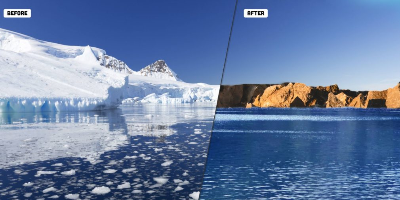1 lugl 2022 anni - UN: Climate change facts
Descrizione:
FACT: Climate change is caused by human activityNatural changes in the sun’s activity or large volcanic eruptions have caused ancient shifts in the Earth’s temperatures and weather patterns, but over the last 200 years, these natural causes have not significantly affected global temperatures. Today, it’s human activities that are causing climate change, primarily due to the burning of fossil fuels like coal, oil, and gas. (IPCC)
Burning fossil fuels creates a blanket of pollution trapping the sun’s heat on Earth and raising global temperatures. (Global warming then leads to other changes like droughts, water scarcity, severe fires, rising sea levels, flooding, melting polar ice, intense storms and declining biodiversity.)
The more of this pollution, such as carbon dioxide (CO2), accumulates in the atmosphere, the more of the sun’s heat gets trapped, the warmer it gets on Earth. There is a strong relationship between cumulative CO2 emissions and the increase in global surface temperature. (IPCC)
The amount of CO2 in the atmosphere has been increasing at an unprecedented rate since the Industrial Revolution, when manual labor began to be replaced by machinery fueled by coal, oil and gas. Today, the concentration of CO2 in the atmosphere is about 50% higher than in 1750, far exceeding the natural changes over at least the past 800,000 years. (IPCC)
Sustainable Sundays
Illustration: UN DGC
Video: IPCC
FACT: Scientists agree that humans are responsible for climate change
Multiple independent studies over the past 19 years have found that between 90 and 100 per cent of scientists agree that humans are responsible for climate change, with most of the studies finding a 97 per cent consensus.
A 2021 study found a greater than 99 per cent consensus on human-induced climate change in the peer-reviewed scientific literature (reviewed by export in the same field prior to publication) - a level of certainty similar to that of the theory of evolution.
The Synthesis Report by the Intergovernmental Panel on Climate Change (IPCC), released in March 2023, categorically confirmed that human activity is the overwhelming cause of climate change. The IPCC’s comprehensive assessments are written by hundreds of leading scientists from around the globe, with contributions from thousands of experts, and endorsed by the governments of every country in the world.
FACT: Every fraction of a degree of warming matters
With every increment of global warming, extreme heat and rainfall events become more frequent and more intense. (IPCC)
Greenhouse gases, such as carbon dioxide, from human activities are responsible for approximately 1.1°C of warming since 1850-1900. (IPCC) This has already caused significant changes in the climate, including more extreme weather events, which have caused widespread harm to people and nature. (IPCC)
If global warming exceeds 1.5°C above pre-industrial levels, there will be more heat waves, longer warm seasons and shorter cold seasons. At 2°C of global warming, extreme heat would more often cross critical tolerance thresholds with devastating impacts on agriculture and human health. Increasing changes to wetness and dryness, to winds, snow and ice, coastal areas and oceans, will affect different regions in different ways. (IPCC)
Good Food For All - Watch and Do Party
Graphic: UNFCCC
Video: United Nations
FACT: The climate is changing faster than humans, plants and animals can adapt
If global temperatures keep rising, adapting to climate change will become increasingly difficult, especially for poorer countries. A small island, for example, may become uninhabitable due to sea level rise and lack of sufficient freshwater. In that case, inhabitants may have no other option than to abandon their homes. (IPCC)
Adaptation alone cannot keep up with the impacts of climate change. Adaptation is crucial for saving lives and livelihoods, but humans’ ability to adapt to climate change is not limitless. (Insights)
Rising sea levels that submerge coastal communities and extreme heatwaves intolerable to the human body are examples of ‘hard’ limits to our ability to adapt. (UNFCCC)
With increasing global warming, losses and damages will increase and more human and natural systems will reach the limits of their ability to adapt. Many species and ecosystems are already near or beyond their adaptation limits. (IPCC)
Aggiunto al nastro di tempo:
Data:
1 lugl 2022 anni
Adesso
~ 2 years and 11 months ago
